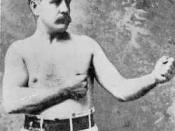Just as Jem is entering puberty, turbulent enough on its own, his faith in man evaporates with a jury's verdict of "Guilty"æguilty"æ guilty"æ guilty"æ"à(211). Jem is one of the few in town who expects justice will be served and Tom Robinson will be acquitted, let alone in "five minutes"à(210). The jurors side with racism over reasonableness, and "His shoulders jerked as if each "ÃÂguilty was a separate stab between them'"à(211). His disillusionment upon seeing humans make the obvious wrong choice is enough, but it occurs at a critical point in his life, leaving Jem confused and helpless. Yet, with Atticus's reassurance Jem is able to overcome his anger and once again become another moral guide in Scout's life.
Jem demonstrates his ability to serve as a moral guide by stopping Scout from killing something innocent. He tells Scout "Don't do that"æ he answered drowsily"à(238). Scout tries to draw back into the childhood world of actions without consequences by killing the bug, but Jem is able to recognize it as the death of another defenseless mockingbird.
The beginning of the novel supports the idea that Jem is able to surmount the challenge of conquering his anger; Scout claims that "the Ewells started it all, but Jem"æ making Boo Radley come out"à(3). Jem is able to understand the changes that both he and Scout underwent. They tried "Making Boo Radley come out"à(3) as immature children, before they recognized him as an inherently good fellow human being rather than a ghost to be laughed at. Jem's ability to recognize the good in someone ends his disgust with society.





